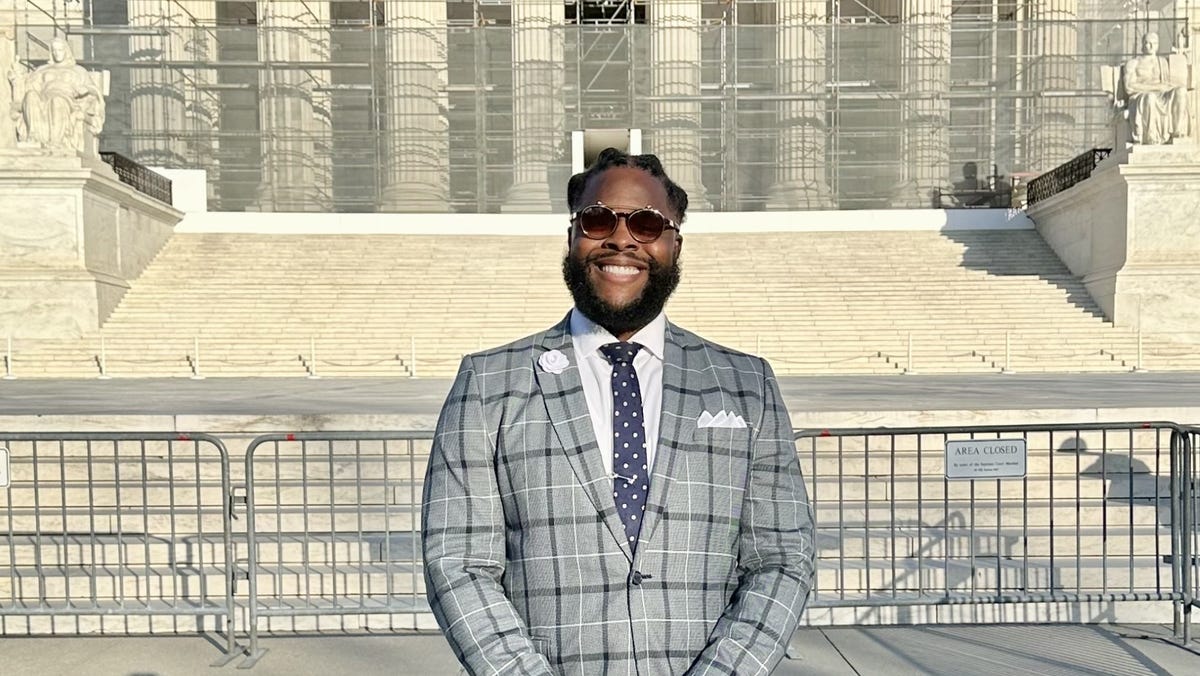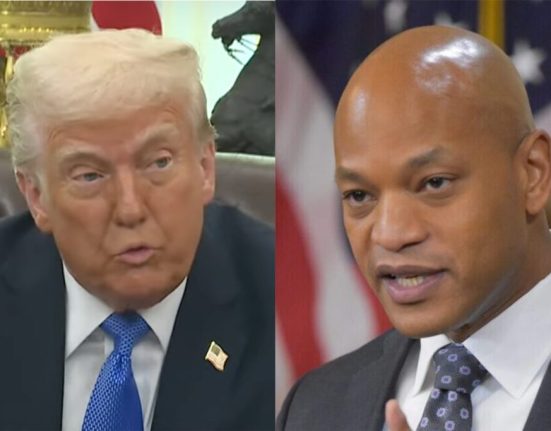A union representing 150,000 federal workers faces allegations of financial improprieties at one of its chapters. In an era of mass federal layoffs, here’s why it matters.
The labor union that represents more than 450 train engineers for New Jersey Transit walked off the job after contract talks stalled.
The labor union that represents more than 450 train engineers for New Jersey Transit walked off the job after contract talks stalled.
- In total, Bruce alleges that more than $116,000 went missing from the National Treasury Employees Union Chapter 212 in San Francisco, which represents about 900 workers within HHS.
- Bruce’s revelations come on the heels of the 2024 arrests of seven union officials and they have put him at odds with national union headquarters.
A chapter of the second-largest union representing federal employees allegedly mishandled more than $100,000 in union funds− the highest amount in 25 years − USA TODAY has learned.
A former Food and Drug Administration employee named Brandon Bruce says he uncovered the scheme after digging into his chapter’s books.
When Bruce took two trips from San Diego to suburban Washington, D.C., with his labor union leaders, he submitted $3,500 in expense reports for a daily rate, hotel, taxis, and airfare. His union president, who traveled separately, got reimbursed for about $8,500.
The two men stayed in the same hotel in the same city and were entitled to the same reimbursement rate each day, Bruce said. His boss traveled from Arizona which would not have accounted for the large discrepancy in airfare. Maybe he flew first class, Bruce jokes.
But after Bruce got elected to a leadership position within the union, he found irregularities in the chapter’s records. Two iPads and an iPad mini were purchased for the chapter president in a three-year period. A $12,000 storage unit was approved by the treasurer, who made checks out to someone with her own last name to clean it out. A man with no formal position in the union signed checks, including to himself.
In total, Bruce alleges that more than $116,000 went missing from the National Treasury Employees Union Chapter 212 in San Francisco, which represents about 900 workers within the Department of Health and Human Services. No one has been charged with a crime in relation to the missing funds. The Department of Labor indicated it in April it had pending “investigative proceedings” related to the chapter.
“As with any investigation, NTEU does not comment on investigations currently in progress,” said Mike Givens, a national spokesperson for the union.
The National Treasury Employees Union is the second-largest federal employee union and represents 150,000 workers in 37 different agencies, including agencies the Trump administration has targeted for mass layoffs such as the Internal Revenue Service and the Department of Health and Human Services. But just when those employees are most reliant on their union for protection and advocacy, the union is facing its biggest allegation of financial impropriety in at least 25 years.
Bruce’s revelations come on the heels of the 2024 arrests of seven union officials − including two former chapter presidents − at a chapter in upstate New York who are accused of stealing $56,000 from the union and the government. The union has seen at least seven other cases of financial misconduct citations against union officials at other locations, according to reports from the Department of Labor.
Bruce’s allegations have put him at odds with the national union headquarters.
He reported what he knew to the national union but also the Department of Labor and the FBI. But he no longer has a job with the Food and Drug Administration, after the national union and the man he accused of misusing funds challenged his ability to use work hours for union business.
Errick King, the president of union Chapter 202 in the D.C. area that represents Treasury employees, says the union should have parted ways with the former chapter president from Arizona long ago. Instead, he said energy is being spent on internal drama instead of the fight against the Trump administration.
“This matter should’ve been dealt with. It should be closed out, and we should move forward,” King said. “Take the energies of what you have (been fighting over) internally, and to use that to be out here on the front line of this fight.”
FDA employee raised “major accounting issues”
Brandon Bruce joined the Food and Drug Administration in 2014 as regulatory counsel at the Center for Tobacco Products, managing third-party contracts with state and local governments. Ambitious and outspoken, he’s also a labor advocate who nests himself comfortably as a thorn in the side of the powerful.
After years of working as a union representative and representing his colleagues in disputes with federal agencies, including the FDA, he ran for and won a vice president position with Chapter 212 in 2023. He quickly found what he called “major accounting issues” under the leadership of chapter president Michael Roberts and reported them to the union’s national headquarters.
He wrote in a July 2023 letter to national union president Anthony Reardon obtained by USA TODAY that the union’s books hadn’t been audited in years, and said the union went years without filing timely reports with the Internal Revenue Service. The letter said he wasn’t receiving required communication from Roberts about expenditures or payments. He asked the union to remove Roberts from his position.
Roberts did not respond to USA TODAY’s voicemails and emails seeking an interview for this story.
Doreen Greenwald, who replaced Reardon as the president of the national union and is a former IRS employee, responded to Bruce’s concerns in an October 2023 letter also obtained by USA TODAY.
The letter said the union performed an investigation, and went through Bruce’s concerns point by point. She said she would order an audit to be conducted promptly but also said that Bruce hadn’t provided evidence that union money was stolen.
She also acknowledged that two people, federal retirees Randy Plunkett and Betty White, were signing checks from the union even though they weren’t members of the union.
USA TODAY left voicemail and email messages for White and Plunkett seeking comment. Neither person responded. The national union declined to provide their contact information.
Greenwald assured Bruce that Roberts had solved the problem: Plunkett and White would pay their lapsed dues to become members of the union again. Then, in the near future, Plunkett would be elected to an official position, and White would be elected treasurer. Greenwald said he should go to the treasurer about financial concerns − even though the treasurer would soon be White, one of the people Bruce had raised questions about.
“I know and respect that you are a zealous advocate and sincerely want to better the lives of those we represent,” she told Bruce in closing. “I encourage you to work closely with your chapter president Michael Roberts.”
7 years of financial records
In 2024, Bruce decided to run for union chapter president against Roberts. But there was a big hitch: His boss at the FDA wanted to fire him, in part because he was spending too many working hours attending to union business, according to disciplinary records obtained by USA TODAY.
As vice president of the chapter, Bruce was spending all of his working hours on behalf of the union, something that is common in federal employee unions. But Roberts told the federal government that he revoked Bruce’s privilege to spend all his time on union work in July 2023, just days after Bruce brought his allegations to the national union, disciplinary records show.
Bruce told his boss the agency’s allegations were based on a misunderstanding of his union contract. But Bruce told USA TODAY he switched to using just half his time for the union when he found out. Months later, a representative from the national union told the FDA he wasn’t allowed to spend any time on union business without the chapter president’s permission, according to disciplinary documents. Bruce got fired in November. His boss at the FDA said his conduct was unbecoming of a federal employee, and at one point he was AWOL.
Bruce won the election in December anyway, which the union said he was eligible for because he had still been an employee in August when a candidate had to be qualified. He obtained the chapter’s financial records dating back to 2018 and brought the records to a public accounting firm to examine “improprieties.” He reported the findings to the Department of Labor and the FBI. He and the executive board removed Roberts, Plunkett, White and two board members.
Greenwald, the national union president, said she opened an investigation into the expulsion of Roberts, Plunkett, White and two other board members, according to documents obtained by USA TODAY. On May 27, she overturned their expulsions, according to a letter obtained by USA TODAY.
The audit listed about two dozen checks made out to Roberts, Plunkett or White. The checks usually had signatures from two people: the person who received the money, and one of the other three. The most common memos written on the checks were related to travel or travel vouchers.
Roberts, the previous Chapter 212 president, was one of the signatories on two separate checks to himself in 2019 — one for exactly $4,000 and another for about $4,500 — described as “vouchers,” according to the audit and the copies of checks. Bruce says this was for the two trips they took to suburban Washington, D.C. in 2019. His own reimbursements were two checks for about $1,900 and $1,500.
Roberts signed two checks to himself totaling about $2,200 for two iPads in the course of 10 months, records show, after purchasing an iPad mini with union funds two years before that, according to an email reviewed by USA TODAY.
White and Plunkett also signed more than 20 checks to “Public Storage,” according to the audit, totaling about $12,500. The two also signed checks to Gregory White Hauling & Salvage and to Gregory White for expenses the memos on the checks said were related to storage and cleanup, according to the audit and copies of the checks provided to USA TODAY.
Public records show White is married to someone named Gregory White, who is listed at the same phone number as her. USA TODAY was unable to find a company called Gregory White Hauling & Salvage registered with the California secretary of state. USA TODAY left a voicemail for Gregory White but did not receive a response.
In 2020, 2021, and 2023, despite checks showing that the chapter had spent money, the chapter filed annual reports with the Department of Labor saying that the chapter had spent $0, according to the audit and copies of the reports. Roberts and White filed new reports for these years in September 2024 disclosing spending, according to records reviewed by USA TODAY.
King, whose chapter represents Treasury employees in the D.C. area, accused the national union of just hoping the internal problem goes away, and instead the issue is creating an embarrassment.
“You need to address this,” King said. “This needs to be resolved because this isn’t a good look for us.”
The role of the Department of Labor
Misuse of union funds ran so rampant in the first half of the 20th Century that Congress passed a law stiffening financial disclosure requirements for unions in 1959. The Department of Labor invites people to report embezzlement through its website and performs audits at random and based on complaints.
“Over the past five years, there have been hundreds of U.S. union officials at all levels − local, international − convicted of embezzlement, corruption, racketeering and there are lots of others that we know about that have been investigated,” said Stan Greer, a senior research associate at the National Institute for Labor Relations Research, which is critical of unions.
Susan Schurman, a professor of labor relations at Rutgers University, said there are significantly fewer resources at the Department of Labor compared to the number of unionized firms and unions where wrongdoing may be occurring.
“There’s money there. There are incentives. And there are some people who are going to take advantage of that. And I don’t think that’s special about unions,” Schurman said.
The Department of Labor was aware of issues with Chapter 212’s recordkeeping when it audited the chapter’s 2017 records, and chose to counsel the chapter on its reporting requirements, according to a copy of a letter to White from an investigator at the Office of Labor-Management Standards obtained by USA TODAY.
The audit also showed the chapter wasn’t properly reporting payments to officers, and needed to re-submit its 2017 report within a month.
Across the National Treasury Employees Union since 2001, prosecutors have brought cases and police have arrested people on charges related to theft or false statements at eight chapters and the national headquarters, according to records published by the Department of Labor. Cases from 2013 in California and Utah alleged about $38,000 and $20,000 went missing, respectively.
The most sweeping case came in July 2024 at a chapter in upstate New York that represents employees of Customs and Border Protection. Seven former union officials — including two past chapter presidents — were arrested on suspicion of felony grand larceny, and a seventh was cited for misdemeanor petit larceny.
Six of the men were accused of theft for charging a total of more than $56,000 in duplicate travel expenses to the union and Customs and Border Protection and receiving reimbursement from both, according to court records obtained by USA TODAY. The two former chapter presidents accounted for most of that, at about $30,000 and $15,000. The court did not provide documents for the seventh union official.
Givens, the spokesperson for the national union, told USA TODAY in an email it did not have an update on the case. USA TODAY left voicemails for current chapter leadership but did not receive a response.
A surprise bill for more than $90,000
Bruce has spent the first half of the year simultaneously fighting to get his job at the FDA back and responding to concerns from union members who have been affected by the Trump administration’s massive attempts to shrink the federal workforce.
A program specialist working in a branch of the Department of Health and Human Services told Bruce she received her layoff notice in early April that inaccurately represented her performance appraisals, among other things. She quickly brought Bruce and other union advocates into the fold, according to an email reviewed by USA TODAY.
Other union members have come to Bruce with issues such as being unable to meet Trump’s return to office requirement or not receiving their last paycheck after being fired.
“It is kind of disappointing that we’re paying dues and expecting them to protect us, and we still got fired twice,“ Candice Donaldson, who worked as a social scientist at the FDA but was fired in February and then May 8 as part of mass firings of early-term employees, said of the national union.
In the middle of all this, on April 9, Bruce received an email from a collections agency showing that the San Francisco union, Chapter 212, owed nearly $92,000 to the Department of Health and Human Services, according to a copy of the email and collections notice reviewed by USA TODAY. “I thought it was a scam email,” Bruce said of when he received notice of the debt. “Then I look at the address and I’m like, ‘This is Mike’s address.’”
Roberts, who is retired, wrote in an email to union officials reviewed by USA TODAY that the debt dates back to travel during his time as an employee with the Food and Drug Administration, part of the Department of Health and Human Services. The email did not make clear where the travel was, when, or for what amount, but it said some of the travel was for work, and some was for another union chapter, which he did not name.
Roberts said the union contract at the time made the agency responsible for costs related to agency travel, and other travel related to the unnamed chapter should have been paid by that chapter. He described a lengthy dispute with the government, and he said he does not believe the chapter owes it. “I from the beginning took my fiduciary responsibilities seriously disputing and not paying an alleged debt we did not owe as a chapter,” he wrote.
Bruce said the debt should have appeared as a liability on the union’s annual financial disclosures to the Department of Labor. Roberts wrote it was appropriate not to report the debt on the disclosure form because it “was not a debt we actually owe.”
USA TODAY did not receive responses from the Department of Treasury or the Department of Health and Human Services about the debt.
Bruce said he intends to pay the debt with union money, but has also asked the union’s insurance company to agree to cover what he considers a loss due to malfeasance. By May 15, the debt increased to more than $95,000 due to fees and interest. And the government can still choose to garnish the chapter members’ dues until the debt is paid.
“You gotta make the taxpayer whole,” Bruce said. “This isn’t their debt.”







